The 1987-88 season may be the most exciting we have ever seen in Greek stadiums. By the time it was over, Giorgos Koskotas had given up football, the Vardinogiannis brothers had been accused of beating up OAKA officials and AEK denounced an attempted bribe in the Cup match against Olympiakos. And the final of the Cup between Panathinaikos and Olympiakos, which was decided on penalties in favor of PAO, with Nikos Sarganis shouting "their president, I left it to Mr...." went down in history as the derby of hatred.
All this, however, was nothing in front of the history of Larissa, who went on to win the championship (the first and only provincial team with such a title) after first their fans cut Greece in two, protesting the punishment of their team , due to Giorgi Chigov. The Bulgarian striker had been caught for using a banned substance in the match against Panathinaikos and according to the regulations at the time, the team of a doped football player was penalized by deducting 4 points.
The reactions of the friends of AEL, or rather of the entire Thessalian capital, were unprecedented, the PASOK government was alarmed as never before and the blessed Sifis Valyrakis, Deputy Minister of Sports, was forced to change the law. In case of use of prohibited substances, only the football players and not the teams would be punished. In Larissa, the four points were returned and thus AEL continued its journey to the title.
It is said that the government and Andreas Papandreou himself were informed of the risk of a complete diversion of the situation in Larissa, by George Lianis, who together with Costas Hardavelas and Yiannis Dimaras, made an emergency broadcast of "Reporters" on the subject of " rebellion of the plain". Others argue that the involvement of Olympiakos in a doping case (with Uruguayan Diego Aguirre being caught for using a banned substance) made it easier for Valyrakis to change, overnight, football regulations.
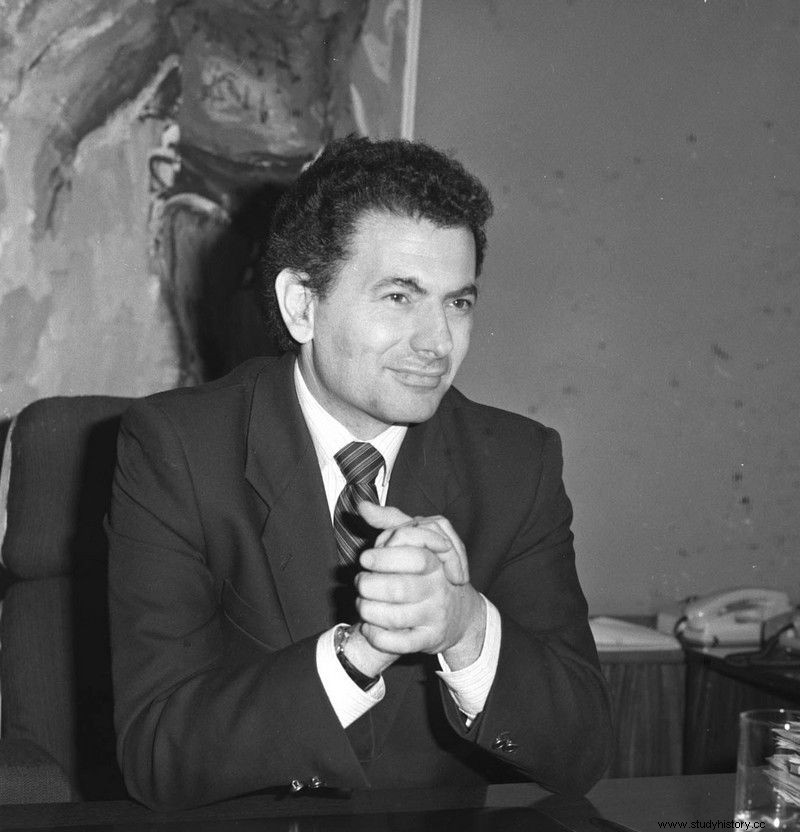
Today, March 16, 1988, the first instance decision for the removal of 4b, had brought all of Larissa to the streets. Five days later, the Papandreou government dribbled a la Karapialis. The people of Larisa, who remember those days as the "sporting Killeler" of Thessaly, had achieved their goal. This story, with the help of the front pages and reports of the newspaper "Filatlos", we will remember together.
Enjoy reading...
Gmoh puts Chigoff
It all started on the last Sunday of 1987 (27/12) when Larissa welcomed Panathinaikos for the 12th matchday of the championship. The "crimson" were in first place in the standings with 9 wins, 1 draw and 1 loss. The championship started with an impressive 3-1 win over Olympiakos. On the bench is Jacek Gmoh and on the field the big team with Mitsibona, Galitsio, Voutyritsa, Alexouli, Tsioli, Karapialis, Valaora and others.
"Alcazar" is full every time AEL is home. Same with Panathinaikos. Larissa leads 2-0 thanks to Mitsibona's two goals in the 34th minute with a volley in the area of the Moon and in the 40th minute with a well-placed penalty kick. Panathinaikos, despite being left with 10 players, due to Antonio's suspension, reduced the score to 2-1 with a header from Bacsinila.
In the 67th minute, Jacek Gmoh makes his first change, throwing the Bulgarian Tsigov into the match, instead of Ziogas. Four minutes later he put Athanasiou in place of Voutyritsa. The match ended 2-1 in favor of AEL, who remained first in the standings with 23b, two more than OFI who were in second place.
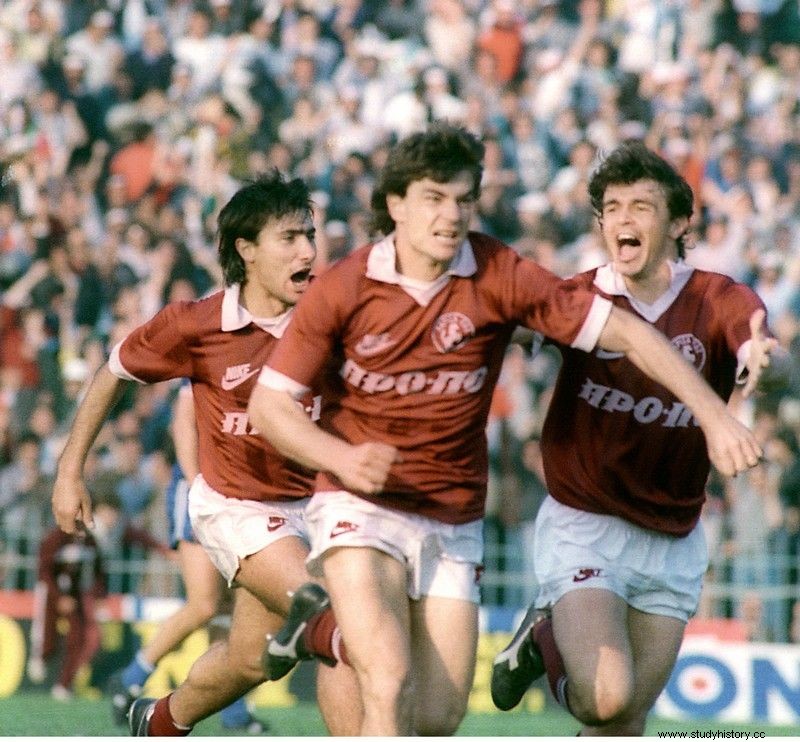
No one suspected what would follow. Even when Panathinaikos asked Tsigov to pass doping control. It was his right, according to the rules, to ask a third player to check. After all, Larisa had done it too, choosing Vangelis Vlachos as a third player for control by Panathinaikos.
The Bulgarian striker was acquired in the summer, usually came off the bench and scored 4 goals. For a substitute striker, not bad. AEL will lose to Iraklis 1-0, will have three draws with PAOK (1-1) and Olympiakos (2-2 in Karaiskakis) and the very strong that year Ethniki (0-0). It remains at the top, with AEK, however, approaching it by two points.
The "partaolas" Koskotas
Meanwhile, Greek football is living a paranoia. In the Panathinaikos-AEK derby (3/1/88), the lawyer N. Mavrommatis complains that he was attacked and beaten by Giorgos and Vardis Vardinogiannis (!) in the official OAKA, while the third brother, the blessed Thodoros, also participated in the episode. The two major shareholders will be summoned to an apology, but based on testimonies, they will be acquitted, with Panathinaikos, however, being punished with 3 matches for the specific episode, as well as the two damaged coaches of the AEK fans.
The one who stole the show, however, was Giorgos Koskotas. The wealthy banker had bought Olympiakos in November 1987, joining hands with the late Stavros Daifa. Koskotas came in like a siphon. In the winter transfers, he took... 15 footballers, two famous Latin Americans (Hilberto Funes, Diego Aguirre), even buying Tyce Liebrechts, coach of PAOK, who a few days before he went to Rentis, had led Dikefalos to a triumphant 6-1 on the "red and whites" in Serres.
The appearance of Koskotas shakes up football. They say that Stavros Koskotas, George's brother, went to Drama to get Sakis Moustakidis from Doxa, having 8 million drachmas in ... paper bags! The Koskotades are everywhere, buying everything in front of them, making deals for the summer, getting into basketball, looking unrestrained, spreading millions (that weren't theirs).
Liebrechts would not stay long in Piraeus. Only eight league matches (and three cup) was coached by the Dutchman, who after the 2-0 defeat by Panionios, was fired by Koskotas, a month and a half after he was hired. A few days later, with official coaches Pavlos Grigoriadis and Yiannis Gounaris, Olympiacos welcomes AEK in the rematch of the Cup (first game 1-1). The "red and whites" with scorers Hatzidis, Mitropoulos and Founes walk away with 3-1, solemnly taking the ticket for the next phase.
But the match is accompanied by an orgy of rumours. Inside AEK they believe that their team is "holed". Some players have been approached for reduced performance! "Filatlos", which followed a very hard line against Koskotas, is released with a historic front page
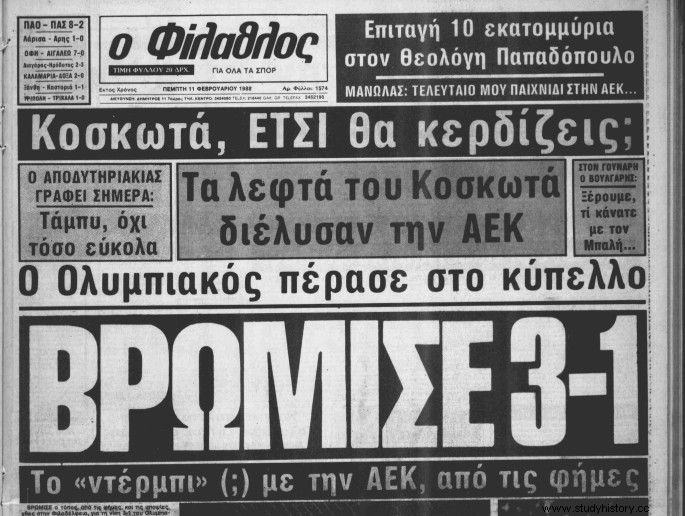
A day later, AEK denounces an attempt to bribe the goalkeeper of Theologia Papadopoulos, with Aris football player Dino Ballis as an intermediary. Greek football is shocked and for a month it lives in a paranoia, with real facts, rumors and speculation mixed in a dangerous cocktail.
Papadopoulos (whom the newspaper "Dikefalos" renames to ... Diabologija) who was wildly booed by AEK fans in the Karaiskakis match, had confessed that they approached him and offered him 10 million drachmas. The official AEK maintains that it has a recorded tape with dialogues between Ballis and Papadopoulos, which, however, it never shows in court.
In the end, the decision of the sports judge is the conviction of Dinos Ballis and the acquittal of Papadopoulos. Olympiacos is also acquitted, whose involvement is not proven anywhere. How can one imagine the noise that would break out in Larissa would be much bigger than the gloomy case of Papadopoulos.
Tsigoff's codeine
On January 31, the pioneer Larissa was waiting at the Alcazar for Panachaiki. Two days earlier comes the first shock. The prohibited substance codeine is detected in the urine of Giorgi Chigov! This, according to article 32 of the CAC, meant the exclusion of the footballer and the punishment of AEL by deducting 4 points.
Thessalians claim to be cool and ignorant of the case of the Bulgarian hunter. According to "Philathlos" of 31/1/1988, codeine is not a stimulant substance, it is found in many drugs and the doping of Chikov, who was treating a minor cold with medication, was formal and not essential.
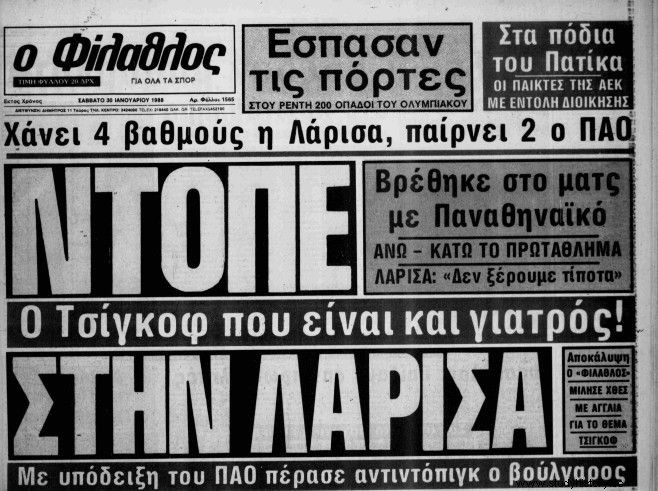
Apparently, typical doping does not exist and article 32 seriously threatened Larissa. Panathinaikos adds fuel to the fire by implying that he "knew something" about the Tsigov case. As a result of "magic", fantasy reporting? Who knows. However, the title Dope Tsigoff, who is also a doctor, has gone down in history because we don't know what the former football player studied, however, at the age of 61, he now works as ... a customs officer on the border between Greece and Bulgaria.
The protagonist of the story, thirty years later, had given a long interview on the website on larissa and had talked about the era, the doping case, Gmoch who raided houses and called him ... a communist and the continuation of his career ( in Cyprus, he left shortly after the announcement of Larissa's acquittal, which eventually caught him too, due to the retroactive abolition of the right to choose a third player, apart from the two predetermined ones).
"I had no guilt, even when I was initially punished, because I knew exactly what had happened... I was shocked of course, when they told me that I was found doped with codeine, but I knew it couldn't be true... It wasn't certain, after all, that it was to play in that match against Panathinaikos, Gmoh put me on for 15 minutes...I was coming off an injury and had come a week to Bulgaria for recovery:the treatment given to me by the doctor here was known to the team doctor in Larissa, not there was something reprehensible... The agents of the team knew it and they didn't leave me exposed for even a minute, the management treated me perfectly, they supported me because they knew there was no problem... And the few friends I had in Larissa supported me..." said Chigoff
Back in 1988, after the initial numbness, Larissa goes on the counterattack and talks about a scam. The match with Panachaiki that follows is a first opportunity for the people of the team to shout "hands down from AEL". Twelve thousand people watch their team score four goals and remain first in the standings. While waiting for the examination of the second sample, everyone was in a waiting position. The cauldron was simmering.
Aguirre and the trial
On 14/2/1988, the laboratory in Madrid announces that the second sample is also positive, the intervention of a representative of the GGA who takes the sample and leaves, provokes the reaction of the AEL, there is a question of re-examination, but without result. Larissa feels the pressure and a decision that will come out after the trial of the case is approaching. On March 3, a broad meeting is held at the Larissa City Hall, where, among other things, various protest actions are proposed. One of them even talks about the capture of the NATO headquarters!
A day later another bomb falls. Diego Aguirre is caught doping, in the match of Olympiakos against Veria (2-0)! The Uruguayan hunter has made use of the (stimulant) substance Phentermine. Parenthetical:Already, within the year, Kalatzis of Panaitolikos and Gakis of Levadeiakou had been caught for using prohibited substances. Aguirre's fourth in a season...
Two years ago, Greece experienced another doping case, with the Chilean Isis of OFI being arrested twice (!) but acquitted, after the opinion of the famous Manfred Donike, from the Cologne laboratory. Isis was indeed dope, but with a smaller amount than normal, as the German doctor who was later involved in the Ben Johnson case opined.
On March 10, 1988, the Tsigoff case was finally heard. On the side of AEL, two university professors, the Prefect, two other MPs (of PASOK) try to exonerate Larissa, but without being able to prove that Tsigoff did not take the codeine. The football player himself states that he does not remember if and when he took the substance, the sports judge V. Andronikos reserves the decision, which is determined to come out in five days.
"Philathlos" presents the subject
in its own way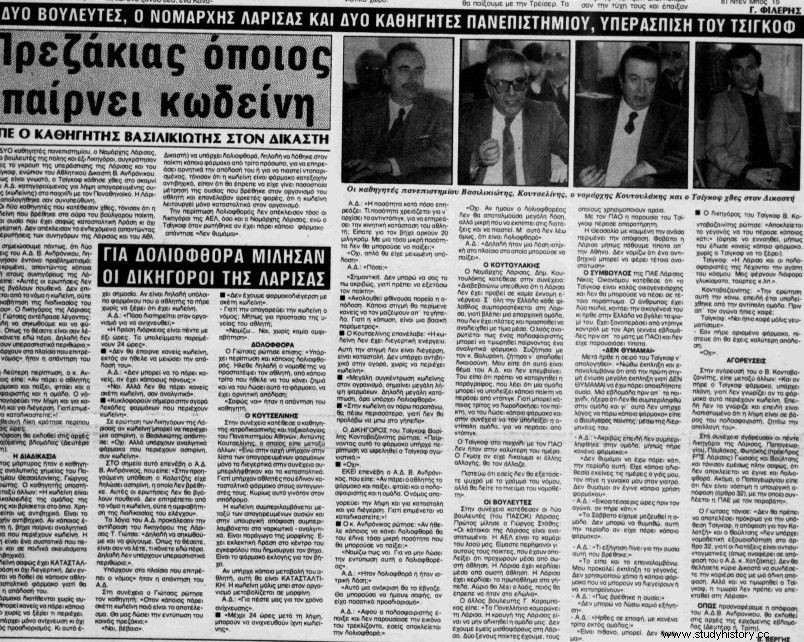
The anxiety reaches its peak and the historical president Stelios Kantonias suffers a heart attack from the stress. He enters the intensive care unit, while the decision is being prepared by Andronikos.
Everyone on the road!
On March 16, the Sports Referee issues his decision. Two-year suspension for Tsigov, -4b in Larissa, return 2b in Panathinaikos. It is noon and all of Larissa is listening to the radio. Church bells are ringing, people are taking to the streets and everyone, young, old, men, women, children, is upset. The journalist Sotiris Kellas was then a young editor at the newspaper "Eleftheria" where he still works today.
"All of Larissa felt wronged. And the whole city came forward to defend their team" he remembers 34 years later and adds:"'We were gathered in the cafeteria "Z". The title, from the last name of the owner and blessed now, Zafiris. Everyone is upset, shouting, protesting and the idea falls spontaneously. We go to the National Highway ! It was not pre-planned, it arose from an idea of the moment and became reality. For 24 hours, Greece was cut in two.
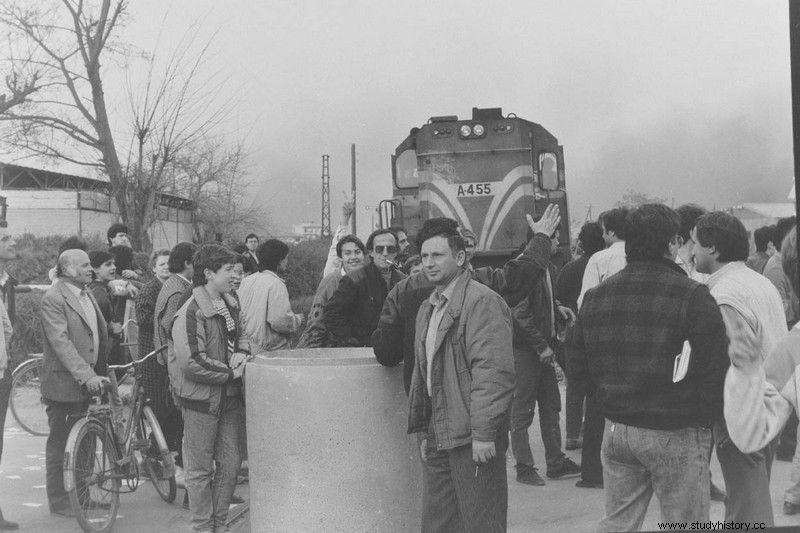
No cars were passing, neither up nor down. Some more hot-blooded burned tires, others stopped the ... train. Something unprecedented happened. And you know something. Now that the years have passed and those of us who lived through it are telling it to the younger ones, I see doubt in their eyes. They don't believe us..."
Larissa is on fire the next day as well, in a march that almost the entire city participates in. Says Sotiris:"Thousands of thousands on the street shouting. It was a new killer. The sports killer. That's how we call it and that's how we remember those two days. These reactions scared the government. Reporters had come, George Lianis, Yiannis Dimaras and Costas Hardavellas for a broadcast from Larissa and the subject of people's reactions. Lianis, as they say, had a direct line with Papandreou and contacted him, sounding the alarm. Basically he told him that in case that Larissa was not entitled to appeal (s.p. the decision would come out five days after the first instance decision) there would be worse reactions".
The truth is Andreas Papandreou had planned an appearance in Thessaly, in the context of the celebration of Killeler. But how would he appear in Larissa, with AEL having -4 points on the head and the whole world angry? The ... Killeler, as Kellas says, but also wrote "Philathlos" was already in progress. Marinos Antipas was missing...
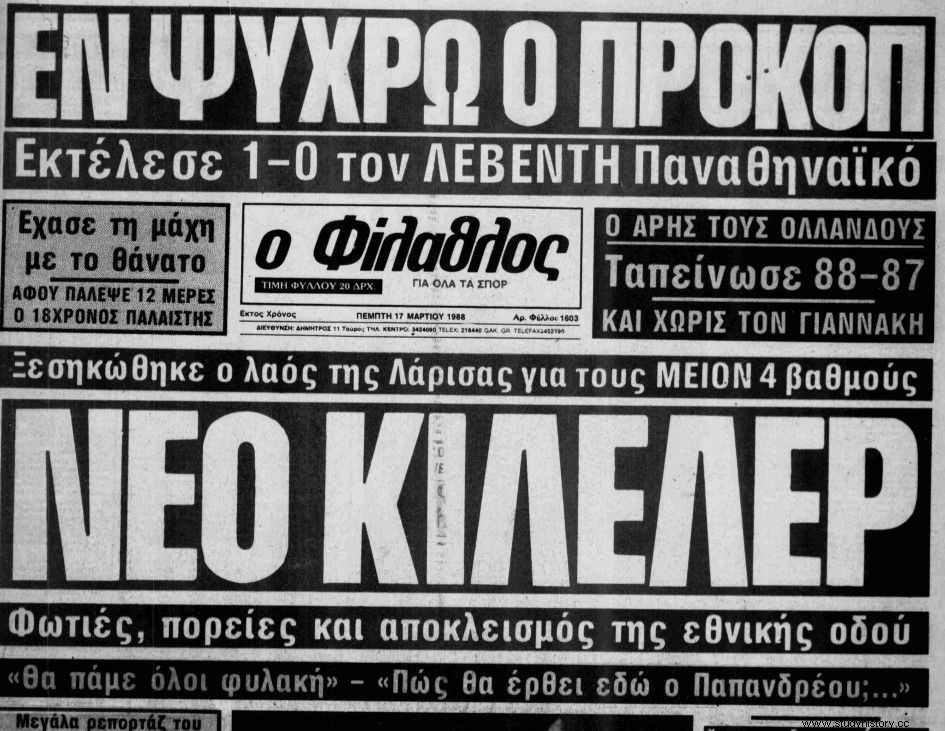
What did all this mean? "There was no way that Larissa would not be acquitted " points out Sotiris Kellas and emphasizes:"All the bodies of the city were mobilized, even the ... Metropolitan participated, there was a strong attitude but also a great love in the team. Proof of how important AEL was, in the end, for the city. We knew it, of course, since during the junta the first demonstration that had taken place in the city was again a protest against the team's injustice in the match against Serres, it was simply confirmed anew. This team, a creation of the Kantonia family, with footballers from Thessaly, became the great love of the city, the most powerful brand. Even now when you say Larissa, the first reaction is AEL..."
See also an excerpt from the show "Reporters" with footage of the reactions of the people of Larisa
The case had reached an impasse for the government. Someone had to take responsibility. The three Judges of the appeals committee refused to ... tamper with the regulations by deciding one thing instead of another. Sifis Valyrakis took the responsibility upon himself. On Friday, the late Deputy Minister of Sports had declared that government intervention was ruled out and on Monday, he did the exact opposite. In order to relieve the referees from the mission of acquittal, he made sure to amend Article 32. From that moment on, doping punishments would only apply to the footballers and not to the teams. Valyrakis also decided on the establishment of ESCAN, with the press, however, welcoming his decision ... not so pleasantly. The front page of "Filathlos" characteristic:
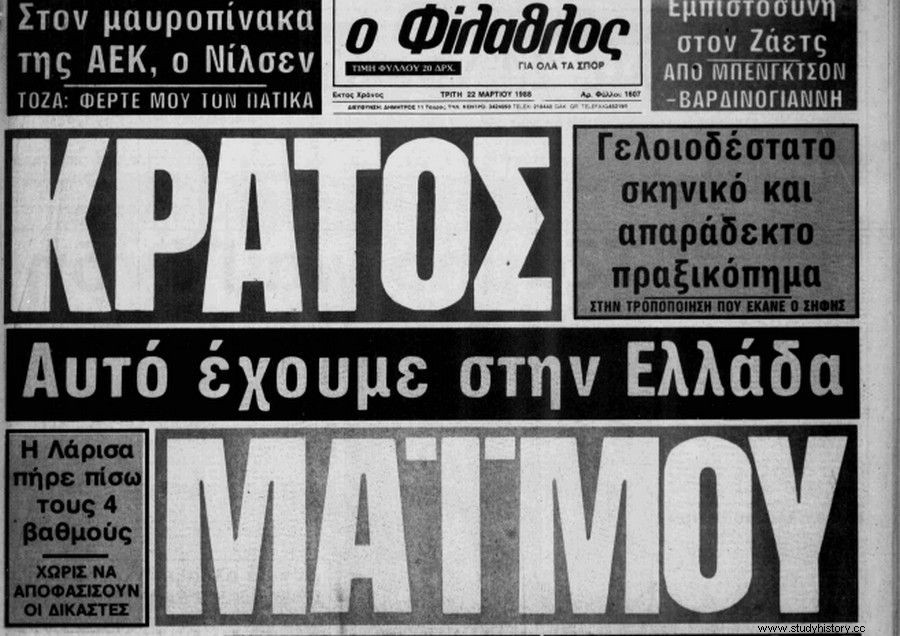
Ο μακαρίτης Κώστας Καίσαρης, έγραφε στο καυστικό ρεπορτάζ της εφημερίδας:"ΠΗΡΕ ΠΙΣΩ τους ΤΕΣΣΕΡΙΣ βαθμούς η Λάρισα. Η κυβέρνηση ΥΠΕΚΥΨΕ στις αντιδράσεις των οπαδών της θεσσαλικής ομάδας και ο Σήφης Βαλυράκης ΤΡΟΠΟΠΟΙΗΣΕ χθες τους κανονισμούς για το ντόπινγκ κοντρόλ. Η απόφαση αυτή του Βαλυράκη δείχνει ξεκάθαρα ότι στον τόμπας δεν υπάρχει ουσιαστικά ούτε υφυπουργός αθλητισμού, ούτε κράτος. Όταν πριν από τρεις μέρες, ο ίδιος ο Βαλυράκης, δήλωνε ότι δεν πρόκειται να κάνει καμιά παρέμβαση στην Αθλητική Δικαιοσύνη.
Όταν δήλωνε ο ίδιος ο υφυπουργός ότι οι Νόμοι που ισχύουν στη χώρα μας είναι πλήρως εναρμονισμένοι με τους διεθνείς. Και έρχεται χθες να ανατρέψει όλα αυτά, να τροποποιήσει τους κανονισμούς ώστε να ΥΠΟΧΡΕΩΣΕΙ τους Δικαστές να αθωώσουν τη λάρισα. Μετά απ' όλα αυτά τι να πούμε;
Μπορούμε, λοιπόν, να πούμε ότι απέναντί μας έχουμε ένα "κράτος-μαϊμού". Ένα κράτος, που ο εκπρόσωπος του, άγεται και φέρεται από τις αντιδράσεις των αδικημένων φιλάθλων. Ένα κράτος που υποχρεώνει τους Δικαστές να βγάζουν ΑΝΤΙΘΕΤΕΣ αποφάσεις, χωρίς μάλιστα να μπαίνει στον κόπο να μας εξηγεί για ποιο λόγο γίνονται όλα αυτά..."¨
Μαζί με τη Λάρισα, βέβαια, η μπάλα πήρε και τον ... Ολυμπιακό που δεν τιμωρήθηκε για την υπόθεση Αγκίρε. Αν έχανε 4βαθμούς εκείνη την στιγμή, η ομάδα του Πειραιά θα βρισκόταν ουραγός στη βαθμολογία. Πάντως στην τελική κατάταξη ο βρέθηκε στην 8η θέση με 31β, πολύ μακριά από την επικίνδυνη ζώνη, αλλά και στην χειρότερη θέση της ιστορίας της στο πρωτάθλημα. Η ΑΕΛ πήρε τον τίτλο με 43β, τρεις βαθμούς περισσότερους από την ΑΕΚ:"Το γλέντι που έγινε δεν ξεχνιέται. Ήταν η αποκορύφωση αυτής της έντονης συναισθηματικά χρονιάς. Ήταν πρωτομαγιά. Όχι η εργατική, όπως σε όλη την Ελλάδα, αλλά η βυσσινί, η δική μας" λέει ο Σωτήρης Κέλλας. Μια επαρχιακή ομάδα αναδεικνυόταν πρωταθλήτρια δια πυρός σιδήρου και πολλά καμμένα λάστιχα στην Εθνική Οδό. Κιλελέρ, είπαμε...
